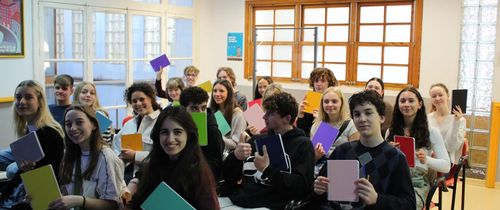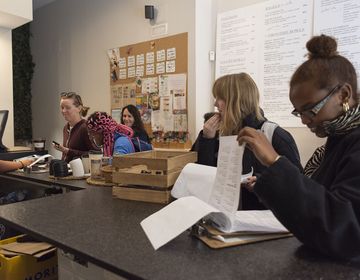
Your CIEE Academic Options
You Can Study and Live Abroad and Still Graduate with Your Class
Make your high school experience extraordinary—and your college application distinctively unforgettable. With CIEE, you have two options to spend a semester (or two) abroad:

- Immersion In means living with a host family while enrolled directly in a local high school.
- Semester In means living with a host family while taking a full schedule of classes at one of six CIEE centers around the world, with course credit that transfers easily to your high school transcript.
CIEE Immersion In Grades & Credits
CIEE Immersion In programs place you in local high schools for the most immersive and authentic experience. Each country and school sets its own class schedules and does not share these ahead of your study abroad experience. It’s important for you to work closely with your U.S. high school guidance counselors or other officials to understand how credits can transfer for the courses you take.
CIEE Semester In Grades & Credits
CIEE Semester In programs make it easy for you to build your schedule and review it with your high school prior to departure. Combining in-person classes on core topics and a wide variety of online courses to choose from, our hybrid learning model allows you to enjoy the benefits of studying abroad with the peace of mind that all your credits will transfer. If your goal is to stay on track for graduation while enjoying the life-changing experience of studying abroad, this is the program for you!
CIEE Semester In Coursework
With CIEE Semester In, you’ll join a cohort of peers for three in-person classes at your local CIEE center. Each topic is pre-selected and adapted to your location, immersing you in the culture and community of your host city.
Subject: Elective
Credit Hours: 75 contact hours, .5 credit hours
Location: London, for all Semester In programs
Spend your first three weeks living and learning with fellow Semester In students in London, developing strong intercultural and leadership skills while honing your abilities in communication, emotional intelligence, and effective collaboration. Learn to navigate cultural differences with curiosity and respect, building the confidence to communicate and lead in a variety of settings as you begin your semester abroad.
Subject: Art
Credit Hours: 75 contact hours, .5 credit hours
Locations: Paris, Barcelona, Dublin, Kyoto, Monteverde, Mérida
Explore the unique culture and landscape of your host country through hands-on workshops, guided tours, and interactive sessions. Learn about art movements and artists that exemplify local cultural traditions and styles. Study key visual art principles, then apply them by creating your own original work that shows your understanding of your host country.
Subject: Science
Credit Hours: 75 contact hours, .5 credit hours
Locations: Monteverde, Mérida, Dublin
Study key ecological principles and examine how natural systems function and respond to change through a blend of classroom instruction and hands-on experiences. Learn about fundamental topics such as ecosystems, energy flow, and biodiversity. Then, apply these concepts to real-world contexts, analyzing environmental challenges and evaluating strategies for sustainability and conservation in your host country.
Subject: Social Science
Credit Hours: 75 contact hours, .5 credit hours
Locations: Paris, Barcelona, Kyoto
Explore how thoughtful design and technology can create cities that are livable, efficient, and resilient in the face of global challenges. Through lectures, workshops, and site visits, you’ll examine how transportation systems, architecture, public spaces, and green technologies connect to shape daily life and urban wellbeing. Learn to analyze existing urban systems, identify challenges, and examine human-centered solutions unique to your city.
Subject: English
Credit Hours: 75 contact hours, .5 credit hours
Location: Dublin
Fine-tune your own writing skills while examining how Irish writers have used stories and poetry to explore themes of identity, belonging, and change. Engage deeply with your surroundings, both as readers and writers, with visits to neighborhoods, museums, and public spaces to understand how the environment influences voice and story.
Subject: World Languages
Credit Hours: 75 contact hours, .5 credit hours
Targeted ACTFL Levels: Novice-Mid / Novice-High
Location: Paris
Develop proficiency in the four language skills (listening, speaking, reading, and writing) at the Novice-Mid to Novice-High level, learning about contemporary French life, and expanding your intercultural competency. Cultural activities and real-world communicative tasks in the community will complement and reinforce your classroom learning.
Subject: World Languages
Credit Hours: 75 contact hours, .5 credit hours
Targeted ACTFL Levels: Novice-Mid / Novice-High
Locations: Barcelona, Monteverde, Mérida
Develop proficiency in the four language skills (listening, speaking, reading, and writing) at the Novice-Mid to Novice-High level, learning about contemporary life in your host country, and expanding your intercultural competency. Cultural activities and real-world communicative tasks in the community will complement and reinforce your classroom learning.
Subject: World Languages
Credit Hours: 75 contact hours, .5 credit hours
Targeted ACTFL Levels: Novice-Low / Novice-Mid
Location: Kyoto
Develop proficiency in the four language skills (listening, speaking, reading, and writing) at the Novice-Mid to Novice-High level, learning about contemporary Japanese life, and expanding your intercultural competency. Cultural activities and real-world communicative tasks in the community will complement and reinforce your classroom learning.
Subject: World Languages
Credit Hours: 75 contact hours, .5 credit hours
Targeted ACTFL Levels: Intermediate-Low / Intermediate-Mid
Location: Paris
Develop proficiency in the four language skills (listening, speaking, reading, and writing) at the Intermediate-Low to Intermediate-Mid level, learning about contemporary French life, and expanding your intercultural competency. Cultural activities and real-world communicative tasks in the community will complement and reinforce your classroom learning.
Subject: World Languages
Credit Hours: 75 contact hours, .5 credit hours
Targeted ACTFL Levels: Intermediate-Low / Intermediate-Mid
Locations: Barcelona, Monteverde, Mérida
Develop proficiency in the four language skills (listening, speaking, reading, and writing) at the Intermediate-Low to Intermediate-Mid level, learning about contemporary life in your host country, and expanding your intercultural competency. Cultural activities and real-world communicative tasks in the community will complement and reinforce your classroom learning.
ASU Prep Global Coursework
Alongside your CIEE classes, you’ll also take three online courses through our partner ASU Prep Global, one of the world’s leading accredited online high school programs. ASU Prep Global, accredited by Cognia, will issue your Semester In transcript, reporting all in-person and online courses.
Working with your home school’s counselor, you can stay on track with graduation requirements and choose from a variety of subjects, like:
- Artificial Intelligence
- Marine Science
- Creative Writing
- Geometry
Explore ASU’s course catalog for course descriptions, eligibility requirements, credit hours, and more.
ASU Prep Global is an accredited online private school offering remote learning from expert digital teachers. Each course integrates research-based methodologies and technologies into the classroom for a next-generation learning environment.
Your courses include ongoing one-on-one feedback via video chat, phone calls, texts, and emails with ASU staff, ensuring you receive personalized support and guidance throughout your classes.
As part of Arizona State University, ASU Prep Global offers concurrent enrollment options, allowing you to take college courses to earn both high school and university credit. Visit ASU’s website to learn more.

Tips Before You Study Abroad
No matter which CIEE High School Study Abroad program you choose, it's important to work closely with your school guidance counselors or other administrators to learn about your school’s credit transfer policies and what steps you need to take to ensure credit transfer if that is what you want to prioritize.
Tips to prepare for your semester abroad:
- Meet with your home school officials to determine if they will accept the credit you earn abroad. Your school also determines how the grades earned abroad are translated on your transcript.
- Plan ahead to stay on track with required classes. Many of our participants complete some graduation requirements, such as English and U.S. History, outside of their High School Semester Abroad program.
- Stay in contact with your counselors and administrators. If you select a CIEE Semester In program, you can review your schedule prior to departure. If you select a CIEE Immersion In program, you will email your class schedule to your home school once you are settled into your semester. With both programs, it’s important to maintain communication with your school!
- If you choose a CIEE Immersion In program, ask your host school for a list of courses you complete. Most host schools don't automatically issue transcripts.
See our FAQs for more information on course requirements, housing, and more!
High School Semester Abroad Blog

How CIEE College Access Helps You Get Into College
Whether you’ve just returned from a CIEE study abroad program for high school students, you’re in the middle of one, or you’re preparing for your summer program, there’s always one... keep reading

How School Counselors Can Help High School Students Study Abroad
During guidance counselor appreciation week, we’d like to show our gratitude for the important role that school counselors play in shaping students’ futures. Whether you’re scheduling classes, resolving conflicts, or... keep reading

10 Top Tips for Learning a Language While Studying Abroad
For young adults planning to attend high school abroad, you're likely looking forward to the chance to travel, meet new people and learn a new language. Studies show that the... keep reading
High School Semester Abroad
Register for one of our upcoming webinars to learn more about our High School Semester Abroad programs. The CIEE team will answer your questions and help you get started on the next steps towards making your study abroad dream a reality.
More Information

Still Have Questions?
Check out our FAQ page for more information on the application, pre-departure process, costs, and more.

Further Assistance
For more help, call our team at 1-866-583-0332 or send us an email at hsabroad@ciee.org today.

Schedule a Call
If you want to schedule a call with a CIEE Enrollment Coordinator in your area, find a time on our bookings page.